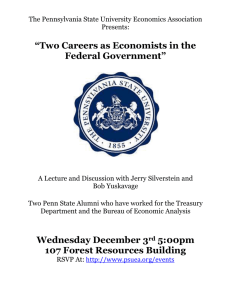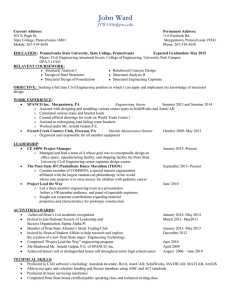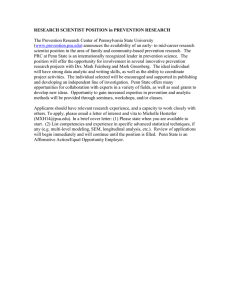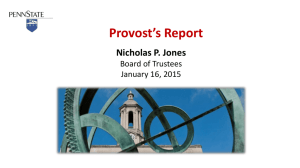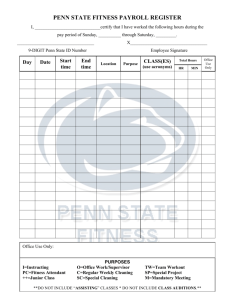Division of Student Affairs Vision, Mission, Overarching Goals
advertisement
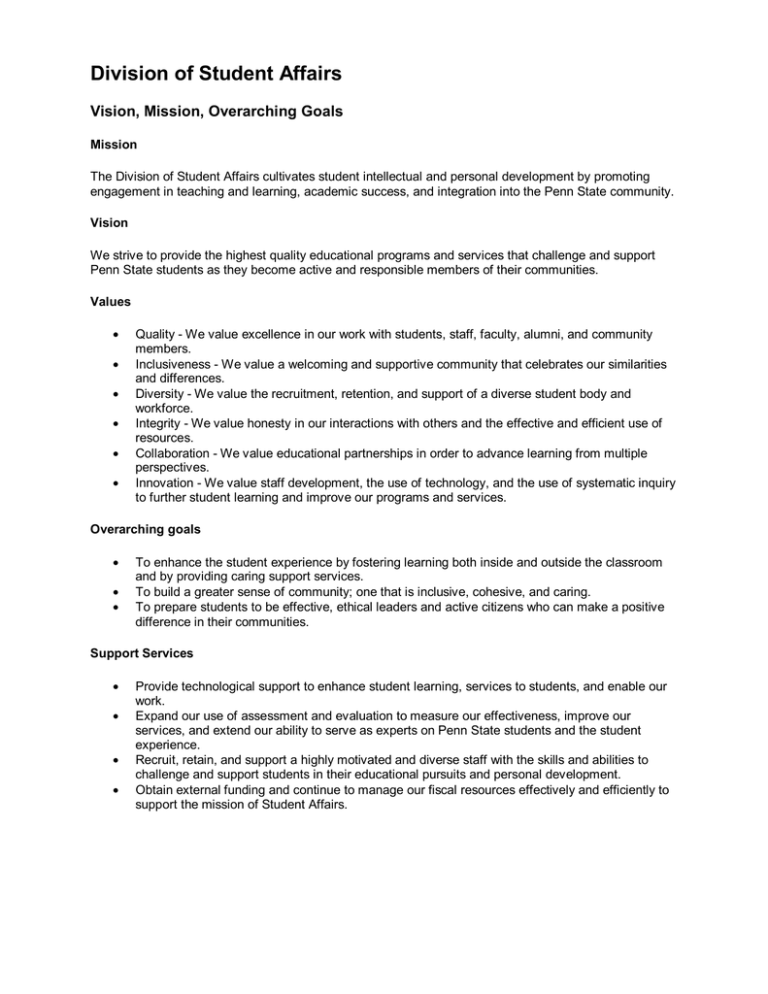
Division of Student Affairs Vision, Mission, Overarching Goals Mission The Division of Student Affairs cultivates student intellectual and personal development by promoting engagement in teaching and learning, academic success, and integration into the Penn State community. Vision We strive to provide the highest quality educational programs and services that challenge and support Penn State students as they become active and responsible members of their communities. Values • • • • • • Quality - We value excellence in our work with students, staff, faculty, alumni, and community members. Inclusiveness - We value a welcoming and supportive community that celebrates our similarities and differences. Diversity - We value the recruitment, retention, and support of a diverse student body and workforce. Integrity - We value honesty in our interactions with others and the effective and efficient use of resources. Collaboration - We value educational partnerships in order to advance learning from multiple perspectives. Innovation - We value staff development, the use of technology, and the use of systematic inquiry to further student learning and improve our programs and services. Overarching goals • • • To enhance the student experience by fostering learning both inside and outside the classroom and by providing caring support services. To build a greater sense of community; one that is inclusive, cohesive, and caring. To prepare students to be effective, ethical leaders and active citizens who can make a positive difference in their communities. Support Services • • • • Provide technological support to enhance student learning, services to students, and enable our work. Expand our use of assessment and evaluation to measure our effectiveness, improve our services, and extend our ability to serve as experts on Penn State students and the student experience. Recruit, retain, and support a highly motivated and diverse staff with the skills and abilities to challenge and support students in their educational pursuits and personal development. Obtain external funding and continue to manage our fiscal resources effectively and efficiently to support the mission of Student Affairs. Pennsylvania State University Cocurricular Outcomes Knowledge Acquisition/Application Students will: Develop an understanding of knowledge from a range of disciplines/areas Demonstrate the ability to integrate and apply ideas and themes across the curriculum and cocurriculum. Cognitive Competency Students will: Acquire learning skills to assist in their academic success Develop critical and reflective thinking abilities Apply effective reasoning skills Life Skills and Self-Knowledge Students will: Determine their career interests Acquire career management skills Develop the ability to manage and resolve interpersonal conflicts Cultivate a propensity for lifelong learning Develop personal health, fitness, wellness and leisure habits and identify health risks Improve self-understanding and awareness by developing an integrated personal identity (including sex, gender, sexual orientation, race, ethnicity, culture and spiritual) Exhibit responsible decision-making and personal accountability Personal Integrity and Values Students will: Acquire ethical reasoning skills Improve their ability to manage their emotions effectively Develop a sense of personal integrity and clarify their personal values Appreciate creative expression and aesthetics Demonstrate compassion and empathy for others Intercultural Development Students will: Possess multicultural awareness and knowledge Develop sensitivity to and appreciation of human differences Exhibit the ability to work effectively with those different from themselves Demonstrate a commitment to social justice Leadership and Active Citizenship Students will: Communicate effectively with others both verbally and in writing Demonstrate an understanding of group dynamics and effective teamwork Understand leadership theory and styles Identify their own leadership style when working with others Develop a range of leadership skills and abilities such as effectively leading change, resolving conflict, and motivating others Develop a deep understanding of sustainability (locally, nationally, globally) and be prepared to lead others in the implementation of strategies for sustainable resource use on campus and in their communities Assume a sense of civic responsibility and a commitment to public life Approved by the Pennsylvania State University Coordinating Committee on University Assessment, May 2006. Penn State First Year Learning Outcomes and Competencies In addition to achieving Penn State's General Education Learning Outcomes, at the end of the first year of academic study, the student will: (1) Understand and meet academic expectations; engage in active learning and use effective time management to balance academic work with extra-curricular activities. (2) Learn about the value of higher education to both society and to individuals; appreciate the value of the general education curriculum and the worth of lifelong learning and scholarship. (3) Be familiar with student services and academic resources on campus; actively use those resources and interact with staff. (4) Engage with faculty in and outside of the classroom. (5) Interact effectively with peers in social settings, and through educationally purposeful student activities. (6) Refine short-term and long-term academic goals; learn about career management; establish more specific career goals. (7) Achieve a higher competency in writing, note-taking, active reading, critical thinking and quantitative reasoning to be able to master college-level work. (8) Expand knowledge of human diversity and cultural competence; effectively interact with others. (9) Engage in activities leading to improved personal health and fitness; learn about making responsible decisions in a college environment. (10) Be a positive and contributing member of the Penn State community; engage in community service activities. Source: The Pennsylvania State University First Year Experience Committee; Approved April, 2005.
